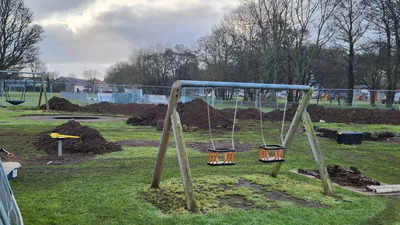
More than 175 World War II-era practice bombs have been uncovered beneath a children’s playground in northern England, raising concerns that more may still be buried, officials have said, according to the New York Times.
The discovery was made during renovation work at
Scotts Park playground
in Wooler, Northumberland, a small town near the Scottish border. Though these were practice bombs used for training, they still contain explosive charges and can be hazardous.
Workers first stumbled upon a suspicious object on January 14 while digging foundations at the site. A second bomb was found the next day, prompting local officials to call in
Brimstone Site Investigations
, a private
bomb disposal
company, for a two-day survey. However, what was supposed to be a brief inspection quickly turned into a large-scale operation.
"It was almost exciting—crikey, we've found two!" said Mark Mather, a county councillor in Wooler, as quoted by the New York Post. But the scale of the problem soon became clear.
On January 23, Brimstone identified 65 practice bombs, each weighing around 10 pounds, along with smoke cartridges. The next day, another 90 bombs were unearthed and safely moved to a designated storage area.
Even though the devices were used for training, they still contained fuses, detonator bursters, and smoke fillings, making them potentially dangerous. “These have been found with their fuse and contents still intact—and the detonator burster and smoke filling in particular can still be potentially hazardous,” the Wooler Parish Council said in a statement.
Link to wartime training
Officials believe the bombs date back to World War II when Wooler was a training ground for the Home Guard, a civilian militia formed to defend Britain from German invasion.
Mather explained that clearing the site has been a slow and meticulous process. The playground sits next to an old railway, meaning that every piece of discarded metal found must be examined to ensure it is not an explosive device. “It's not something you normally expect when you develop in a play park,” he said.
Removal efforts
The ministry of defence confirmed that officials visited the site twice in January to dispose of the first two bombs. It has since been advising local authorities on the safe removal of the remaining ordnance.
About half the park has been cleared, but the search is still ongoing. Officials hope work can restart in April so children can safely use the playground again.

 3 hours ago
3
3 hours ago
3









